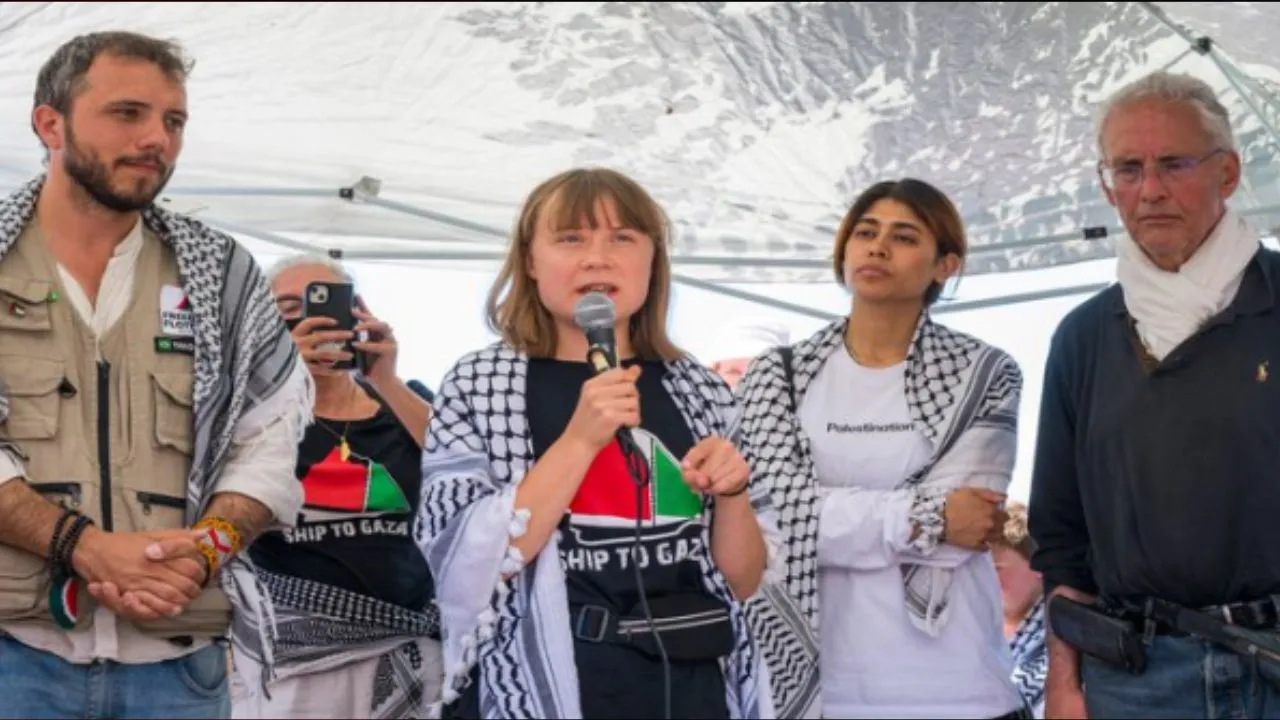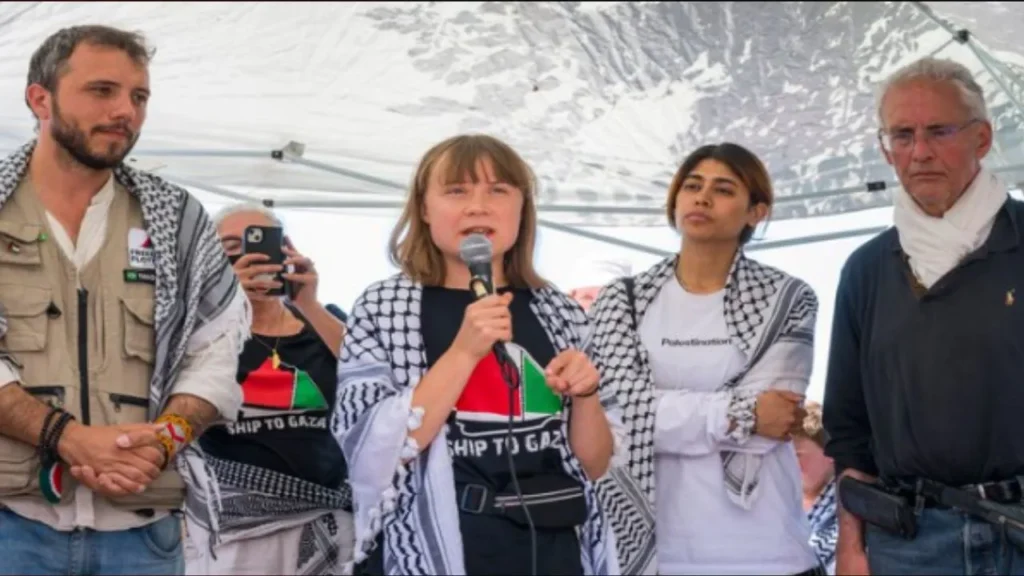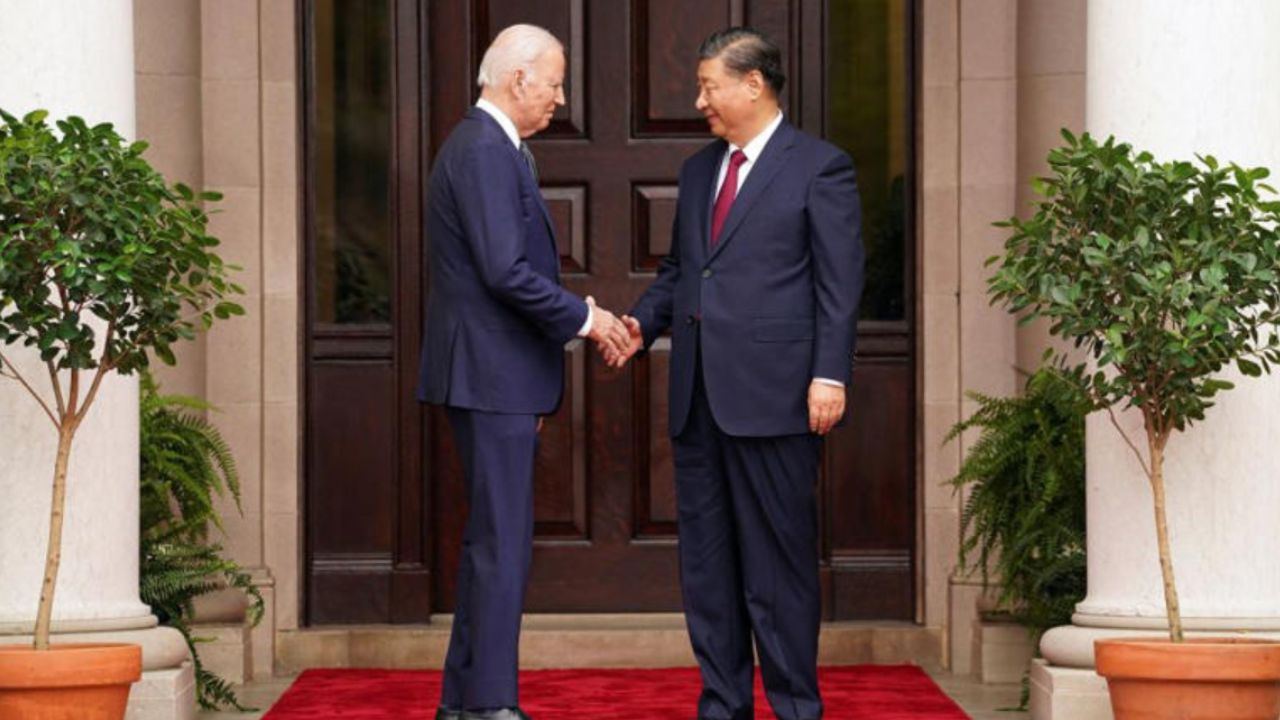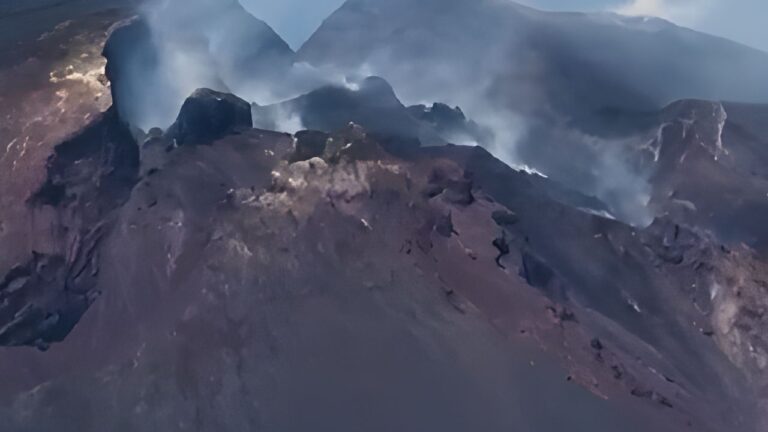Greta Thunberg Sails to Gaza on Aid Ship Amid Escalating Conflict and Drone Attack Setbacks


In a bold move blending activism with humanitarian aid, climate campaigner Greta Thunberg has joined the Freedom Flotilla Coalition (FFC) on a mission to deliver symbolic aid to Gaza, departing from Catania, Italy, on June 1, 2025. The Swedish activist, known globally for her environmental advocacy, boarded the vessel Madleen alongside other activists, including Game of Thrones actor Liam Cunningham, aiming to break Israel’s naval blockade of the Gaza Strip—a blockade that has severely restricted access to essentials like food, medicine, and clean water for over 18 years.
The mission, however, comes in the wake of significant challenges, including a recent drone attack on another FFC ship, Conscience, in early May. The incident, which occurred in international waters near Malta, has raised concerns about the safety of such missions and the escalating tensions surrounding Israel’s control of Gaza’s maritime access.
A Symbolic Mission Amid a Humanitarian Crisis
The Madleen set sail carrying what the FFC describes as “limited though symbolic” barrels of aid, intended not as charity but as a form of nonviolent protest against what the group calls “Israel’s illegal siege and escalating war crimes.” The Gaza Strip, home to over two million Palestinians, has been under a blockade since 2007, with conditions deteriorating sharply since Hamas’s October 2023 attack on southern Israel, which killed 1,200 people and prompted a massive Israeli military response. The ensuing conflict has resulted in what the United Nations describes as “colossal human suffering,” with children facing daily risks of death from airstrikes, disease due to lack of safe water, and starvation amid dangerous food shortages.
UNICEF reports that hunger and malnutrition in Gaza intensified after aid was blocked from entering on March 2, 2025, reversing gains made during a brief ceasefire earlier this year. “The entire population of Gaza relies on aid to survive,” a UNICEF statement noted, emphasizing that humanitarian efforts alone cannot meet the massive needs without safe, unrestricted access.
Thunberg, who rose to prominence as a teenage climate activist, was visibly emotional during a press conference before the Madleen’s departure. Breaking down in tears, she spoke of the urgent need to address the humanitarian crisis in Gaza, framing the mission as a stand against injustice. “This is about solidarity, about standing up for the rights of Palestinians to live with dignity,” she said, linking the environmental and humanitarian struggles. “A world that allows this suffering cannot be sustainable.”
Drone Attack on Conscience: A Stark Reminder of Risks
The mission follows a troubling incident on May 2, 2025, when the FFC’s ship Conscience was struck twice by drones in international waters off the coast of Malta. The attack, which the FFC attributes to Israel (though Israel has not officially commented), caused a fire onboard and left the vessel disabled. Maltese authorities assisted in extinguishing the fire but later impeded FFC volunteers from 13 countries attempting to reach the Conscience to support its crew, forcing them back to Malta under threat of arrest.
The FFC condemned the attack and the subsequent actions by Maltese authorities, calling it a violation of international law and a direct threat to their mission. “The Conscience was preparing to confront Israel’s unlawful blockade of Gaza—a blockade that has denied Palestinians access to adequate food, medical care, and the fundamental right to freedom of movement for 18 years,” the FFC stated in a press release on May 4. The group also accused Israel of escalating its assault on Palestinians since October 2023, describing the siege as a “central weapon” in what they call a “genocidal campaign.”
The drone attack has cast a shadow over the Madleen’s journey, highlighting the risks activists face in challenging Israel’s maritime control. International law experts, such as CFR Senior Fellow David J. Scheffer, have pointed out the complexities of humanitarian missions in conflict zones. “Israel’s blockade, while legally contested, is enforced with military might, and any attempt to breach it is likely to be met with force,” Scheffer noted in a recent analysis of the Israel-Hamas war.
Global Reactions and Social Media Controversy
News of Thunberg’s involvement quickly spread, with USA TODAY posting about the mission on X at 00:20 UTC on June 3, 2025. The post, which garnered significant attention, also sparked polarized reactions. Some users expressed support for Thunberg’s activism, praising her for using her platform to highlight the plight of Palestinians. Others, however, were harshly critical. One user,
@Sarah_Racicist, replied at 00:22 UTC, writing, “I pray Hamas gets their hands on her,” a comment that drew condemnation for its violent tone. Another user,
@DemMalesAreGay, questioned the credibility of those supporting Palestinians, stating, “Why is everyone who supports Palestinians a lunatic?”
The controversy underscores the deeply divisive nature of the Israel-Palestinian conflict, which has intensified globally since the war’s escalation in 2023. International calls for a ceasefire have grown louder, with UN Secretary-General António Guterres warning in January 2025 of the catastrophic toll on Gaza’s civilian population, 80% of whom are considered refugees under international law.
The Broader Context: A Humanitarian Catastrophe
The Gaza Strip, a territory roughly the size of Detroit, was already in a dire state before the current conflict. A 16-year blockade by Israel had left more than half of Gazans dependent on international aid for basic services. Since October 2023, the situation has worsened dramatically. UNICEF reports that around one million children in Gaza and the West Bank were in need of humanitarian aid even before the latest escalation, facing risks from violence, disease, and malnutrition. The agency has been providing medical kits, nutrition supplements, and water supplies, but stocks for treating acute malnutrition are now critically low.
The FFC’s mission, while symbolic, aims to draw global attention to these conditions and pressure governments to act. “We stand in defiance of this injustice, affirming the full political and human rights of the Palestinian people,” the group stated, also calling out the complicity of governments and corporations in maintaining what they describe as Israel’s “system of apartheid.”
What Lies Ahead for the Madleen?
As the Madleen sails toward Gaza, the international community watches closely. Israel has not yet responded to the FFC’s allegations regarding the Conscience attack, and its stance on the Madleen’s approach remains unclear. Past attempts to breach the blockade have been met with forceful intervention by the Israeli navy, raising fears for the safety of Thunberg and her fellow activists.
For Thunberg, this mission marks a significant evolution in her activism, merging her environmental advocacy with a broader fight for human rights. “The climate crisis and humanitarian crises are interconnected,” she said in Catania. “We cannot ignore one while fighting the other.”
As of June 3, 2025, the Madleen’s journey continues, a small vessel carrying a powerful message in a sea of conflict and uncertainty. Whether it will reach Gaza—or face the same fate as the Conscience—remains to be seen.





